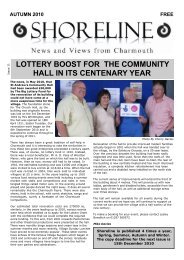You also want an ePaper? Increase the reach of your titles
YUMPU automatically turns print PDFs into web optimized ePapers that Google loves.
the top of a hierarchy tend to be high in Conscientiousness,<br />
high in Extraversion and, if ruthless (which helps), low in<br />
Agreeableness.<br />
It is as if every brain has a large collection of identical trait<br />
generators, set at different levels feeding into the mix.<br />
These individual trait generators gradually get set as the<br />
brain develops during the first 3 years of life in accordance<br />
to the inherited genetic codes. Genes determine and fix the<br />
volume levels, the basis for personality. Further<br />
development (or interference) happens in two ways:<br />
learning and epigenetic change.<br />
The brain is built for learning. A perception can initially<br />
provoke an automatic response driven purely by reflex<br />
emotion, the outcome of which is also perceived. The areas<br />
of the brain activated by each step are freshly connected to<br />
each other, forming a pathway. The same perception will in<br />
future activate the whole pathway: a memory. Each time<br />
the pathway is activated the connections are strengthened,<br />
otherwise they wither (forgetting). If the pathway is<br />
activated without the original stimulus the whole<br />
experience is reconstructed as a mental image<br />
(remembering).<br />
Emotional reactions are therefore constantly modified by<br />
learning, throughout life; however, the strength of<br />
modification is limited and the underlying setting is almost<br />
always salient. Learning also allows us to internalise values,<br />
attitudes and behaviour from the environment,<br />
undoubtedly initially from our parents, but definitely from<br />
peers and individual life experiences, all of it in accordance<br />
to genetic predispositions.<br />
A much more potent change is caused by a change in<br />
genetic activity. Genes have “switches” on their surface,<br />
small molecules. Methyl bonds cause folding of genes,<br />
inactivating them, alkyl bonds open them right out, making<br />
them more accessible and active. These switches are<br />
referred to as the “epigene”. During development and<br />
maintenance of body cells and organs the epigene<br />
determines where and when a gene becomes active, so<br />
that genes are switched on and off at appropriate times.<br />
The switching is controlled by other genes (promoters),<br />
which are themselves activated in a complex chain of<br />
events as the body develops grows and changes.<br />
The epigene has a further function: switching on alternative<br />
or additional genes that could have been dormant for<br />
generations. Many people inherit inactive alternate copies<br />
of certain genes with small differences, known as SNPs<br />
(See part 1). These can become switched on by a stimulus<br />
from the environment. Overall this can allow the species to<br />
adapt more readily to a change in environment. Before<br />
brain development is completed during the first 3 years or<br />
so, personality characteristics are more sensitive to SNP<br />
switching.<br />
For example, persistent high levels of cortisol produced by<br />
recurrent abuse or severe neglect in infancy can result in<br />
switching on of SNPs amongst genes concerned with the<br />
development of the orbitofrontal cortex, resulting in altered<br />
function in this area. This results in a lower capacity for<br />
empathy (or even a complete absence). Hence the<br />
individual is less able to image what others feel, is less able<br />
to care, and likely to be sociopathic and more predisposed<br />
to cruelty. A complete absence of the capacity for empathy<br />
is present in psychopaths.<br />
Nature V Nurture Part 3<br />
Hence an abused child can turn into an abuser, -but only if<br />
genetically predisposed, i.e. only if the relevant dormant<br />
SNPs are inherited. So: is an abuser created by genes<br />
(nature) or by abuse (nurture)? Answer: an interaction.<br />
Many sociopaths and abusers are born with the relevant<br />
SNPs already switched on. (Of course, a reduced capacity<br />
for empathy is no bar to learning what kind of behaviour is<br />
expected from them by society around them and to taking<br />
full responsibility for their actions).<br />
Similarly, genetic predispositions can be inherited to a<br />
variety of mental states, including depression and<br />
“happiness”. Hundreds if not thousands genes are involved<br />
in each personality trait and subsequent mental states. It is<br />
known that the different genes that form the<br />
predispositions to anxiety and depression kick in at various<br />
developmental stages from childhood to early adulthood.<br />
Each of these genetic influences on anxiety and depression<br />
adds to “sensitivity to adversity”. Someone with few of<br />
these genes stay remarkably upbeat and positive when<br />
unfulfilled or when things go wrong. Someone with a heavy<br />
genetic predisposition may feel recurrently or persistently<br />
depressed or anxious even in a life without significant<br />
adversity, and may misperceive minor problems as major<br />
ones.<br />
Ultimately, of course, our behaviour is determined by how<br />
we decide to act, using the thinking part of our brains, our<br />
cognition or “free will”. We know that we need to control<br />
our immediate impulses, urges and desires. (In fact<br />
civilisation has progressed partly because of an ever<br />
increasing cultural imperative of self control. No matter how<br />
bad we are now, we used to be a lot worse 500 years ago).<br />
Nevertheless, people are typically unaware of how much<br />
their rational thinking is influenced by their underlying<br />
psychology.<br />
So, all this can help to explain how we get to differ from<br />
each other, but not why. According to evolutionary<br />
biologists there is very little in life on earth that “just is”.<br />
Every feature of life has evolved because it has a useful<br />
function that increases the likelihood of the genes being<br />
passed to the next generation. So what is the purpose of<br />
this variation in personality? That question will have to<br />
remain dangling from that cliff.<br />
Dr Martin Beckers<br />
Local Prime Pork<br />
I moved back from London last year after pursuing a<br />
career in marketing, working for top brands including Red<br />
Bull, Innocent Smoothies and Magners Irish Cider. The<br />
reason I came back was to help my mother, Felicity, set up<br />
her new Farm Shop in Morcombelake. In my spare time,<br />
with my uncle John Summers, we set about restoring the<br />
fallow horticultural nursery at<br />
Bellair Haye just on the edge of<br />
<strong>Charmouth</strong>. Pig keeping has always<br />
interested me and combined with<br />
the current passion for quality local<br />
produce we decided to combine the<br />
two and launch our own premium<br />
pork brand.<br />
Locally Reared Free Range Heritage Breed Pork.<br />
Available for retail from Felicity's Farm Shop (Morcombelake)<br />
Half pig available to buy. Visits possible by appointment<br />
Call Tom for more details 07812 087 680<br />
Page 13




